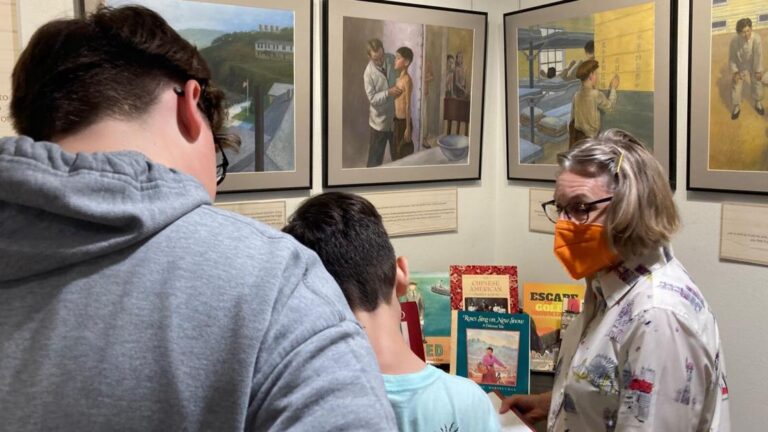There are good reasons the Worlds of Words Center at the University of Arizona is popularly known as “WOW,” and the acronym is only one of them.
Last week, students from Paulo Freire Freedom School visited the center as part of an eighth-grade field trip. While there, they explored an exhibit featuring “paper sons” — a generation of Chinese immigrants who came to the U.S. with false identifies.
Many of those young men were of middle-school age, themselves, and upon hearing of their harrowing experience one young Tucsonan could think of only one thing to say: “Wow!”
Opened in 2007, the Worlds of Words Center of Global Literacies and Literature is a research library and resource center at UA’s College of Education.
Most visibly, it is a collection of 40,000 books. Look closer, and you see they are all written for children and young adults … and they introduce children from all over the world.
People are also reading…
But the Worlds of Words Center is more than a treasure trove of children’s books. The center offers a variety of programs and curriculums to help students learn about cultures other than our own.
Credit UA Professor Kathy Short, who first presented her concept to Dean Ron Marks in 2005.
“As a professor here, I was in the Department of Language, Reading and Culture,” said Short, still the program director today. “My focus as an educator was on inquiry and curriculums, not just here in the U.S. but all around the world. When I traveled, I saw that kids elsewhere had a knowledge of the cultures around them that I didn’t see here in the U.S. I wanted to start changing that.”
Her primary audience: schoolteachers. Their tools: books.
“We wanted to offer programs that would help educators teach children about other countries and other cultures,” Short said. “All kids everywhere love books. There were lots to choose from.”
WOW isn’t a library — books aren’t available for checkout — but the center is open to the public six days a week at 1430 E. Second St. Students, teachers, parents and kids are invited to enjoy the collection in-person.
The Worlds of Words website (wowlit.org) is the real treasure trove, especially for college students and teachers. Sample curriculums, lesson plans, book recommendations and other educational materials attract thousands of visitors a month from all over the world.
Closer to home, the center loans nation-specific teaching kits to Tucson-area schools.
“We have global story boxes that teachers can use in their own classrooms,” Short explained. “For example, if you’re teaching children about Russia you can pick up a box with 20-25 picture books about different aspects of Russian culture. There might be a few books written in Russian so the children can see what words in Russian look like. The box might also have flash cards, photos or a CD so kids can hear what a story sounds like there. Some of them have games that a Russian child might play in school.”
Kits are available from Mexico, Peru, Chile, Korea, China, Somalia, Kenya, Nepal and the Middle East. These boxes are intended for grades second through eighth, but WOW also has picture book boxes for ages 4-5.
“There is also a box to help a teacher talk about sign language for the deaf,” Short said.
One of WOW’s newer programs is called “Imagination Fridays,” a series co-sponsored by the Tucson Festival of Books. Authors and illustrators are featured in online presentations that are available free on the center’s website.
For those visiting the collection in the College of Education, new exhibits are offered each semester. This fall, one of them features children’s books from Ukraine.
Another spotlights the picture book “Paper Son: Lee’s Journey to America,” written by Helen Foster James and Virginia Shin-Mui Loh. It was illustrated with paintings by Wilson Ong, who will be at Worlds of Words for a reception on Oct. 27.
Ong’s father was a “paper son” who came to the U.S. with fraudulent papers during a time when Chinese immigration was essentially barred by the U.S. government. The father came to America on a ship called the Woodrow Wilson, which explains the artist’s first name.
“It’s a fascinating story,” Short said. “During the Chinese Exclusion Act and for a time after that, Chinese people couldn’t come to this country unless they had a parent already living here. So for the right fee, someone would attest that a Chinese child was theirs … whether it was true or not … and give the government specific information about their past. The children would be tested on these points, and if they failed the test they were shipped back home.”
Thousands of Chinese children came to the U.S. this way, most through Angel Island in San Francisco Bay. Angel Island was the West Coast equivalent of Ellis Island, and a small museum there honors these immigrants even today.
Stories such as this one prove that kids aren’t the only ones whose eyes can be opened by visiting Worlds of Words.
“I don’t think the community really knows how much we’re doing or how much we’d like to do,” Short said, but rest assured. The “wow” factor there is real.
Footnotes
Got books? A Community Book Drive benefitting Salpointe Catholic High School is winding down in the next few days. Salpointe’s English department library was lost during the campus fire there this summer. Local do-gooders have invited Tucson to help Salpointe restock its shelves. For more information, visit tucsonfestivalofbooks.org.
Worlds of Words moved from the College of Education basement to the fourth floor in 2014, thanks to a $1.2 million renovation of an under-utilized college computer lab.
The UA Poetry Center will present poet Lorna Dee Cervantes in a free, open-to-the-public reading Thursday at 7 p.m. Info: tucne.ws/1lay
Browse previous Bookmarks columns and keep up with news from the Tucson book community by following Bookmarks Arizona (@BookArizona) on Twitter.



